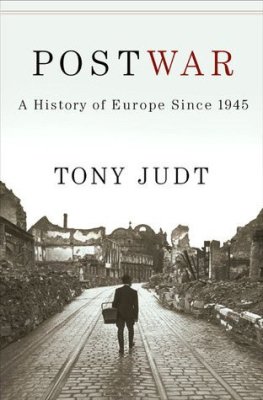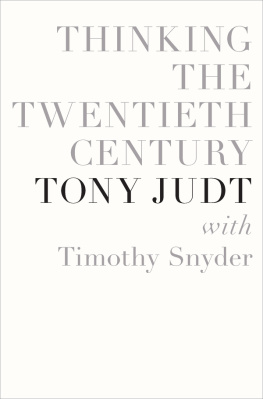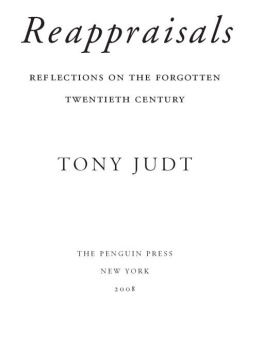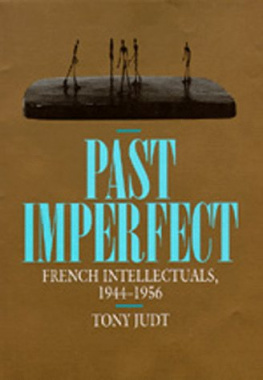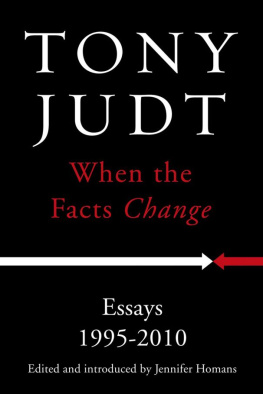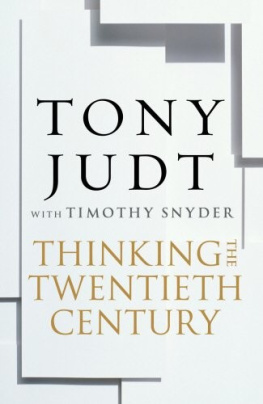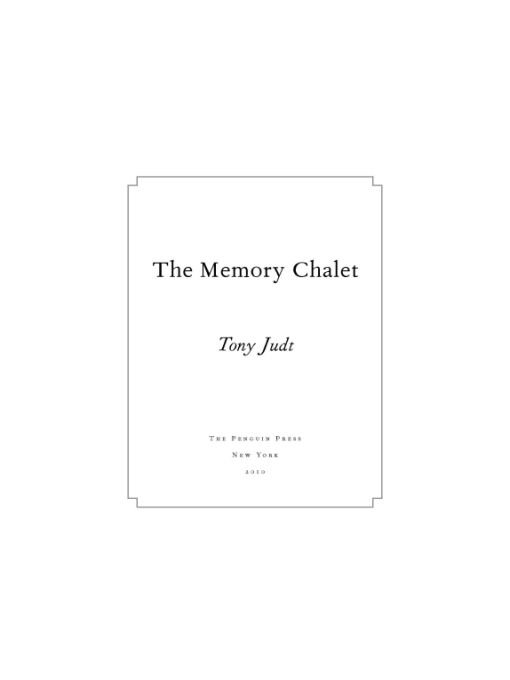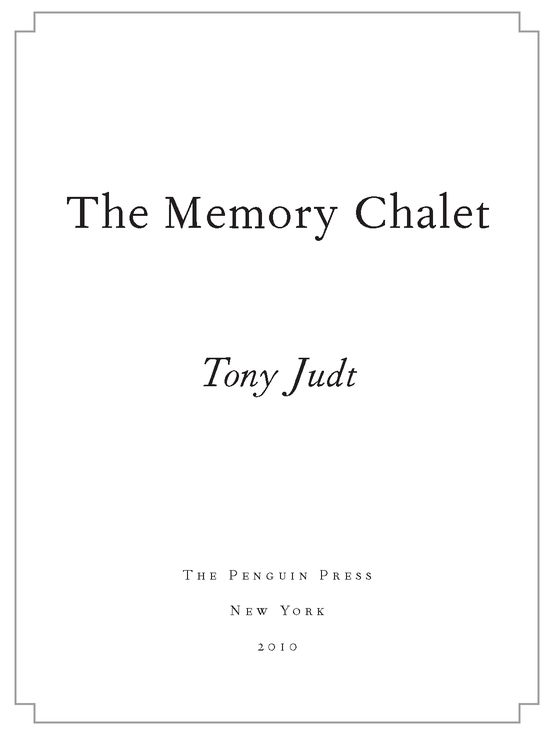Table of Contents
ALSO BY TONY JUDT
Ill Fares the Land
Reappraisals: Reflections on the
Forgotten Twentieth Century
Postwar: A History of
Europe Since 1945
The Politics of Retribution in Europe
(with Jan Gross and Istvn Dek)
The Burden of Responsibility:
Blum, Camus, Aron, and the
French Twentieth Century
Language, Nation and State:
Identity Politics in a Multilingual Age
(edited with Denis Lacorne)
A Grand Illusion?:
An Essay on Europe
Past Imperfect:
French Intellectuals, 1944-1956
Marxism and the French Left:
Studies on Labour and
Politics in France 1930-1982
Resistance and Revolution
In Mediterranean Europe 1939-1948
Socialism in Provence 1871-1914:
A Study in the Origins of the
Modern French Left
La reconstruction du Parti
Socialiste 1921-1926
THE PENGUIN PRESS
Published by the Penguin Group Penguin Group (USA) Inc., 375 Hudson Street, New York, New York 10014, U.S.A. Penguin Group (Canada), 90 Eglinton Avenue East, Suite 700, Toronto, Ontario, Canada M4P 2Y3 (a division of Pearson Penguin Canada Inc.) Penguin Books Ltd, 80 Strand, London WC2R 0RL, England Penguin Ireland, 25 St. Stephens Green, Dublin 2, Ireland (a division of Penguin Books Ltd) Penguin Books Australia Ltd, 250 Camberwell Road, Camberwell, Victoria 3124, Australia (a division of Pearson Australia Group Pty Ltd) Penguin Books India Pvt Ltd, 11 Community Centre, Panchsheel Park, New Delhi110 017, India Penguin Group (NZ), 67 Apollo Drive, Rosedale, North Shore 0632, New Zealand (a division of Pearson New Zealand Ltd) Penguin Books (South Africa) (Pty) Ltd, 24 Sturdee Avenue, Rosebank, Johannesburg 2196, South Africa
Penguin Books Ltd, Registered Offices:
80 Strand, London WC2R 0RL, England
First published in 2010 by The Penguin Press,
a member of Penguin Group (USA) Inc.
Copyright The Estate of Tony Judt, 2010
All rights reserved
The Memory Chalet and New York, New York are published for the first time in this book. Putney was first published by the Guardian (UK). Cars was published in Folha de S. Paulo (So Paulo) and is published here for the first time in English. The other essays first appeared, some under different titles, in The New York Review of Books.
eISBN : 978-1-101-48401-2
Without limiting the rights under copyright reserved above, no part of this publication may be reproduced, stored in or introduced into a retrieval system, or transmitted, in any form or by any means (electronic, mechanical, photocopying, recording or otherwise), without the prior written permission of both the copyright owner and the above publisher of this book.
The scanning, uploading, and distribution of this book via the Internet or via any other means without the permission of the publisher is illegal and punishable by law. Please purchase only authorized electronic editions and do not participate in or encourage electronic piracy of copyrightable materials. Your support of the authors rights is appreciated.
http://us.penguingroup.com
For Jennifer, Daniel and Nicholas
Preface
The essays in this little book were never intended for publication. I started writing them for my own satisfactionand at the encouragement of Timothy Garton Ash, who urged me to turn to advantage the increasingly internal reference of my own thoughts. I do not think that I had any idea what it was I was embarking upon, and I am grateful to Tim for his confident support of the initial scribblings that resulted.
About halfway through the writing of these feuilletons I showed one or two of them to my agents at the Wylie Agency, as well as to Robert Silvers at the New York Review of Books and was heartened at their enthusiasm. However, this raised an ethical question for me. Because I did not write them with the view to immediate publication, these short pieces never benefitted from an internal editoror, more precisely, a private censor. Where they spoke of my parents or my childhood, of ex-wives and present colleagues, I let them speak. This has the merit of directness; I hope it will not cause offense.
I have not altered or rephrased any of the original texts, which were written with the help and collaboration of my long-time colleague Eugene Rusyn. Reading them over, I see that I have been quite open and occasionally even critical of those I love, whereas I was judiciously silent for the most part regarding people of whom I have retained a less-than-affectionate regard. Doubtless this is how it should be. I do hope that my parents, my wife and above all my children will read in these exercises in fond recall further evidence of my abiding love for them all.
I
The Memory Chalet
For me the word chalet conjures up a very distinctive image. It brings to mind a small pensione, a family hotel in the unfashionable village of Chesires, at the foot of the well-heeled Villars ski region in French-speaking Switzerland. We must have spent a winter holiday there in 1957 or 58. The skiingor in my case, sleddingcannot have been very memorable: I recall only that my parents and uncle used to trudge over the icy foot bridge and on up to the ski lifts, spending the day there but abjuring the fleshpots of the aprs-ski in favor of a quiet evening in the chalet.
For me this was always the best part of a winter holiday: the repetitive snow-bound entertainment abandoned by early afternoon for heavy armchairs, warm wine, solid country food, and long evenings in the open lounge decompressing among strangers. But what strangers! The curiosity of the little pensione in Chesires lay in its apparent attraction to down-at-heel British actors vacationing in the distant, indifferent shadow of their more successful fellows farther up the mountain.
The second evening we were there, the dining room was graced with a volley of sexual epithets that brought my mother to her feet. No stranger to bad languageshe was raised within earshot of the old West India Docksshe had been apprenticed out of her class into the polite limbo of ladies hairdressing and had no intention of exposing her family to such filth.
Mrs. Judt duly marched across to the offending table and asked that they desist: there were children present. Since my sister was not yet eighteen months, and I was the only other child in the hotel, this request was presumably advanced for my benefit. The youngand, as I later surmised, unemployedactors who were responsible for the outburst immediately apologized and invited us to join them for dessert.
They were a marvelous crew, not least to the all-seeing (and all-hearing) ten-year-old now placed in their midst. All were unknown at this point, though some would go on to an illustrious future: Alan Badel, not yet a prominent Shakespearean actor with a respectable filmography to his credit (Day of the Jackal ); but above all the irrepressible Rachel Roberts, soon to become the iconic disillusioned working-class wife of the greatest British postwar movies (


